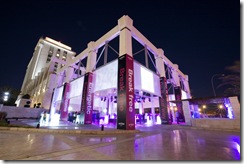Wi-tribe was formed in April 2007, as a joint venture between Qtel and A.A. Turki Corporate Trading and Construction (ATCO), in addition to a technical partnership with US high-speed broadband company Clearwire. Wi-tribe’s aim has been to roll out WIMAX networks across markets in the Middle East, North Africa and South East Asia, and two years after its creation, Comm. goes in search of the progress the company has made to date
Philippe Berard reveals that Wi-tribe also has something in the Philippines where the operator is looking at a business case and is starting to put some plans in place for a roll out
The business case for WiMAX remains for many operators an evolving proposition for which they continue to seek the most appropriate target markets, pricing models, and service differentiators. One player that has taken an early bet on the technology is Wi-tribe, a Bahrain-based operator that has plans to develop WiMAX networks across a number of emerging market regions.
Qatar’s incumbent operator, Qtel which is a majority shareholder in Wi-tribe, describes the investment as a strategic one as it looks to develop into a top 20 telecommunications player by the year 2020, viewing WiMAX as a key technology in helping spur it into new growth markets.
“The interesting thing is trying to understand why Qtel invested at some point in this WiMAX venture because they are already present in the mobile arena as well as the fixed network,” says Philippe Berard, group business development director of Wi-tribe. “Three years ago Qtel started making preparations to become one of the top 20 telecoms companies in the world by capitalisation by 2020. Wi-tribe is very much a part of that effort.”
Wi-tribe’s operations currently extend to Jordan, Pakistan and the Philippines, where it is at various stages in developing nomadic WiMAX networks targeted at suburban users with the ability to pay US$20-25 a month for a broadband connection.
Last June, Wi-tribe launched its first network in Jordan, utilising WiMAX technology from Motorola. Telecoms services can generally be divided into three big arenas, according to Berard; namely personal communications, corporate communications, and residential. “I think we are very much targeting the residential communications sector. We provide terminals with an Internet service access, and look to sell products by household rather than by individual subscriber,” he adds.
Wi-tribe clearly identifies its market focus as the nomadic capability of WiMAX, allowing a user on the move to gain access to the Internet from multiple locations within a coverage area. The WiMAX space in Jordan is a competitive one with Mada Communications having become the latest operator in the country to launch WiMAX in March. The service was initially offered in Amman, along with the major cities of Irbid and Zaraq.
As with Wi-tribe, Motorola supplied Mada Communications with WiMAX access points as well as indoor and outdoor customer premises equipment and portable plug-in devices. Motorola also integrated the operator’s WiMAX Access Service Network (ASN) Gateway to provide a piece of the end-to-end WiMAX network architecture.
Mada Communications (formerly Arabtel), is a Kuwaiti company established in 1982. It has been a licensed wireless provider in Kuwait since 1997, and in 2007 embarked on a strategy to expand in the region. It was awarded a WiMAX licence in Jordan, and in direct competition to Wi-tribe, Mada also harbours plans to become the largest WiMAX operator in the region by end of 2009.
“In terms of markets in which we invest in, we have certain guidelines that we can adjust to different circumstances,” explains Berard. “We might see that the maturity in one market is different to another, and we provide a fixed and nomadic wireless Internet access. At this stage we do not believe that providing mobile services is one of the things we should do, our service stops at being nomadic,” he adds.
Berard believes that WiMAX as a technology will continue to carve out a competitive niche for itself going forward, believing it has an obvious advantage to DSL as it is nomadic, and also given that it has been commercialised some 3-4 years before LTE is likely to start gaining traction in the 2012 timeframe.
“The discussion about LTE is interesting. It is a technology being pushed by mobile operators, though the technology is not available yet. LTE will create a new market though it will use pretty much the same spectrum as WiMAX,” Berard says. “That means in the future, the operator with the licence to operate at say 2.5GHz will have a choice to invest in LTE or WiMAX, and in so doing will be able to preclude somebody else from competing in the same network. We are looking forward to fighting LTE, though we don’t think it is real competition for the coming three years.”
Wi-tribe is also in the final stages of deploying its WiMAX network in Pakistan, a market well known for its adoption of the technology given the massive nationwide investment made by Wateen Telecom, which culminated in the operator placing an order of 198,000 Motorola end-user WiMAX CPE devices for indoor and outdoor use last January.
Wi-tribe targets suburban users with the ability to pay US$20-25 a month for a broadband connection
In much the same way that Jordan is a competitive WiMAX market, so too is Pakistan. Having heralded the investment in the technology in 2007, other operators have since followed Wateen’s lead in announcing ambitious targets for the development of their own networks.
Last November, Mobilink, Pakistan’s leading mobile operator, said it was optimistic its WiMAX broadband and telephony service ‘Mobilink Infinity’ would gain 50,000 subscribers by the end of that year, despite having only commercially launched on October 22.
Mobilink Infinity is based on Alcatel-Lucent’s mobile WiMAX Rev-e technology and attracted several thousand subscribers within its first three weeks of operation in the capital city and business centre of Karachi.
Alcatel-Lucent supplied the WiMAX solution using both fixed and nomadic terminal devices from various CPE partners, as part of its Open CPE programme, designed to ensure service providers have access to a wide range of interoperable end-user devices.
The WiMAX network leverages existing sites and equipment in Mobilink’s GSM network. The subsidiary of Egypt’s Orascom Telecom Group was the second operator to licence WiMAX in Pakistan, the first being Wateen Telecom.
Wi-tribe looks to launch in Pakistan before the end of Q309, a market in which the company completed the purchase of a 75 per cent stake in Burraq Telecom in May 2007.
Burraq is an established operator licensed to offer a full range of telecommunications services across Pakistan, including long distance international and wireless local loop. The company also has associated spectrum at different frequencies. Burraq has also completed a limited rollout of its Broadband Wireless Access (BWA) network in all of Pakistan’s 14 regions.
“We also have something in the Philippines where we are looking at a business case and are starting to put some plans for the roll out together as well,” reveals Berard. “We have a few other countries that we are about to close as well, and so from 2010 onwards we will be looking to launch those operations as well.”
Thus Wi-tribe’s footprint is very much North Africa, Middle East and South East Asia, incorporating Morocco and Turkey, the Middle East, and running down to Indonesia and the Philippines.
As it marches forward, another area in which Wi-tribe would like to see further development is in the selection of infrastructure providers for the networks the operator roll out. Motorola has been the operator’s partner to date, though Berard says he would be keen to have a choice of more than one vendor in order to sharpen all parties’ efforts in the development of networks.
“We like Motorola very much, and that’s also associated to our history with Clearwire. Clearwire is a technical support and technical consultant to us and most of the networks they rolled out were based on Motorola technology,” Berard comments. “The network we are rolling out in Pakistan is based on Motorola. The plans we have for entering other countries include Motorola. Now we don’t want to belong to one vendor and we need to modernise this monopoly, so are looking to bring somebody else in but I think with two suppliers in the WiMAX arena we would probably be happy, we don’t need more than that,” he added.





2 comments ↓
Hi,
I am really glad things are getting better in Pakistan. Back in 2003 whilst I was in in the country running a bathroom furniture and accessories store, because of poor Internet and telecommunication connections things did not quite work out.
I am happy that the telecom landscape has now reached the next level, which is a development that can be used as one of the most impressive marketing support mediums.
Regards,
Natasha
London UK
More power to Wi-tribe.
Leave a Comment